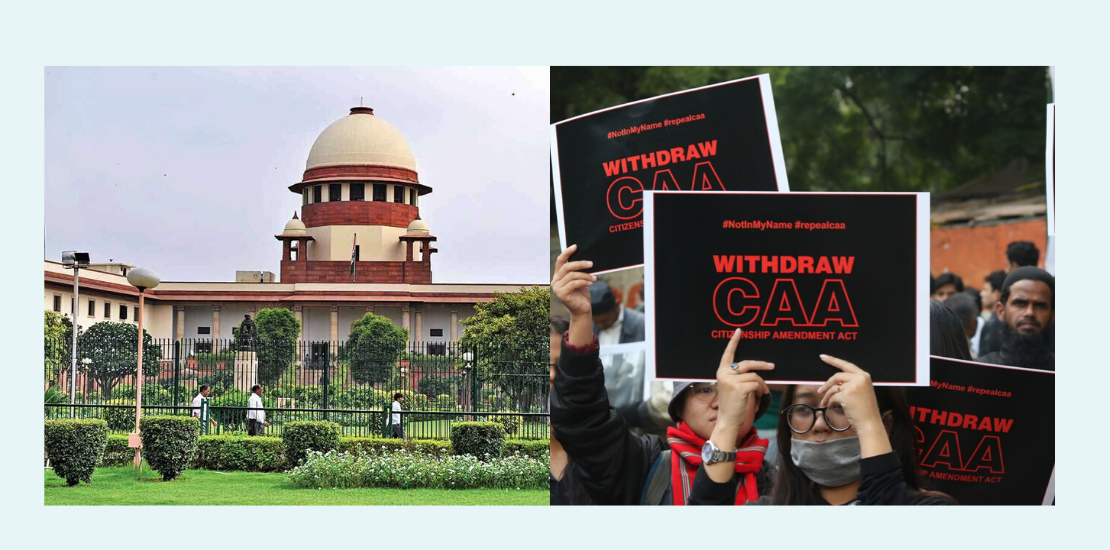Today, a brief hearing was conducted in the Supreme Court of India where a three judge bench, headed by Chief Justice of India (CJI) S A Bobde, said that the court will not put a “Stay” on implementation of the Citizenship Amendment Act, 2019 (CAA) saying “we will have to see whether the Act has to be stayed”. The court, however, issued a notice to the centre asking it to respond to the 59 petitions that the apex court has received challenging that the CAA is constitutionally invalid.
Justice Surya Kant and Justice B R Gavai were also a part of the three judge bench, and the bench has set the next hearing date as 22nd of January 2020.
In the hearing, the court advised Attorney General K K Venugopal, Centre representative in the case, that the government should consider the use of AV (Audio-Visual) media to inform and educate the citizens of India about the CAA, 2019.
Yesterday, Amit Shah, Honourable Union Home Minister has said that the government led by Narendra Modi will not back down.
In a rally in Dwarka, Delhi, Amit Shah said “No matter what hurdles come along the way, the Modi government will ensure these refugees get Indian citizenship and live as Indians with honour and dignity”, while a fresh, peaceful protest turned violent in Seelampur area in East Delhi yesterday.
Read The Article Here: Protest Against CAA Turns Violent in Seelampur
Recently, both Amit Shah, and Prime Minister Narendra Modi have seen major backlash against them due to CAA. On Monday, Modi, by a tweet, said that in a discussion and debate are necessary in any democracy, however damage to public property in the name of protest is unfortunate.
Violent protests on the Citizenship Amendment Act are unfortunate and deeply distressing.
— Narendra Modi (@narendramodi) December 16, 2019
Debate, discussion and dissent are essential parts of democracy but, never has damage to public property and disturbance of normal life been a part of our ethos.
As protest against the CAA throughout India came to light, various political parties and civil societies appealed the Supreme Court, asking it to stop the CAA from being implemented. Indian Union Muslim League, and BJP Ally in Assam, Asom Gana Parishad (AGP) are amongst many who have filed petitions in Supreme Court of India.
In Assam, Protests against the Citizenship Amendment Act (CAA) broke out when it was just a Bill and was being debated in parliament.
On Monday, Prafulla Kumar Mahanta, Former CM of Assam and MLA (Member of the Legislative Assembly) from AGP said, pointing at Centre, “India is a secular country. No one is above the law and certainly not above the Constitution. When the Constitution was adopted, it was said that India is a secular country”.
The petitions that are submitted to the apex court claims that the CAA violates the basic fundamental of Indian Constitution as citizenship cannot be given on the basis of religion. They say that giving citizenship on the basis of religion violates the right to life. The petitioners say that the government is bound to give equal treatment to all people irrespective of their faith.
Also Read: Citizenship Amendment Bill Explained
The opposition is also claiming that CAA is against the Article 14 of the Indian Constitution, which says Equality for All and equal treatment to all before the law irrespective of their citizenship status.
According to the CAA 2019, all refugees from Bangladesh, Pakistan, and Afghanistan who belong to Parsi, Hindu, Sikh, Christian, Buddhist, and Jain minority group will be given Indian Citizenship, provided they arrived in India on 31st December 2014 or before that.
The law will give protection to tribal areas from certain parts of the North East and areas (including the entire state of Manipur) which comes under the Inner Line Permit (ILP).


